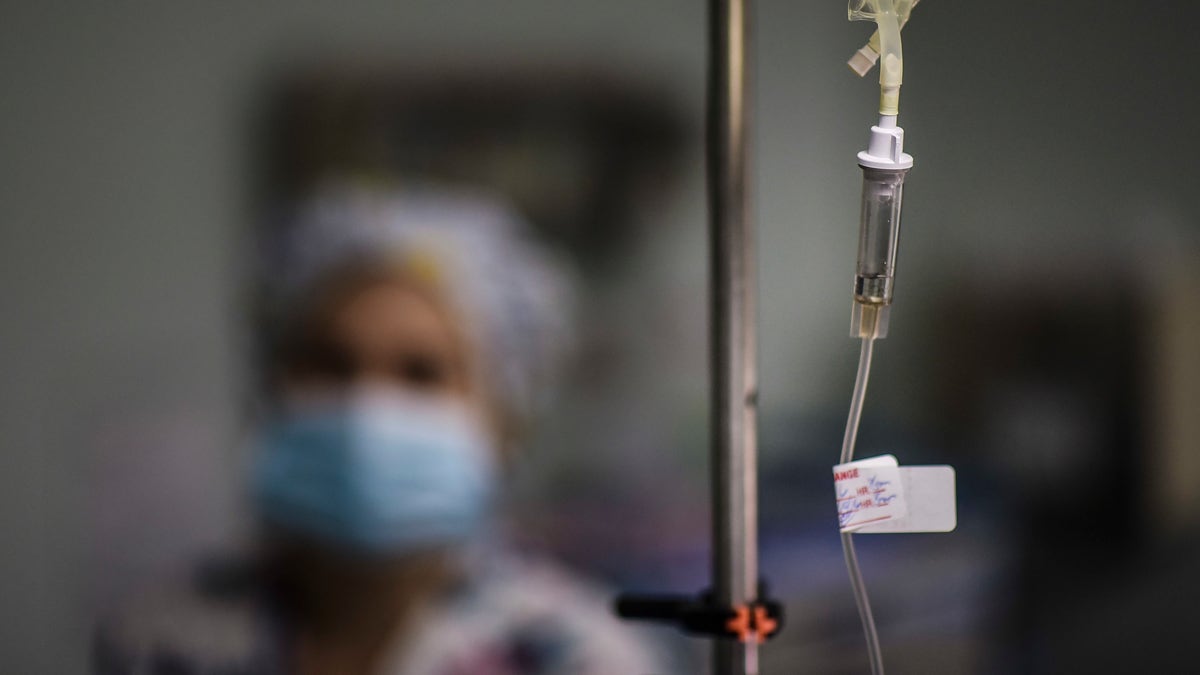
In this Oct. 7, 2016 photo, a nurse provides assistance to the surgical staff at the Dr. Isaac Gonzalez MartÃnez Oncological Hospital in San Juan, Puerto Rico, where services are offered to cancer patients with limited financial resources. Like many doctors, nurses are also moving to the United States in search of better wages. (AP Photo/Carlos Giusti) (Copyright 2016 The Associated Press. All rights reserved.)
SAN JUAN, Puerto Rico – Wanda Serrano arrived at Puerto Rico's largest public hospital before dawn to take her 17-year-old son to an appointment. Six hours later, they were still in the packed waiting room hoping to see a doctor.
They had gone to San Juan's Centro Medico to see one of the many kinds of specialists the teen needs for treatment of a genetic disease called tuberous sclerosis, which can cause tumors to grow on his brain, kidneys and other organs. But specialized medical expertise is increasingly difficult to find in the economically troubled U.S. island territory.
Six hours in a waiting room is no longer the exception, but the norm. A pediatric neurologist recently told Serrano that her son, Cedrik, needed to wait 10 months for an appointment.
"I live terrified every single day," Serrano said one recent morning as she clutched his medical records and peered anxiously down a fluorescent-lit hallway for a nurse or doctor. "You feel powerless. You can't do anything except wait for that date to arrive."
Doctors have gradually left Puerto Rico during a decade-long recession that has gripped the island and driven more than 200,000 people to the U.S. mainland seeking better opportunities.
Now, the steady departure of pediatricians, surgeons, orthopedists, neurologists and others has become a stampede as the economy shows no sign of improving and financial problems in the territorial health insurance program make it nearly impossible for doctors to stay in business.
Up to 700 doctors are expected to leave Puerto Rico this year, double the number from two years ago, said Dr. Victor Ramos, president of the island's Association of Surgeons. The territory's number of doctors has dropped from 14,000 to 9,000 in the past decade, the majority leaving for higher salaries and lower living costs on the U.S. mainland.
The island of 3.5 million people now has only two pediatric urologists, one orthopedist specializing in ankle and feet, one pediatric cardiologist, and a handful of geneticists and endocrinologists. It can take a year to see a specialist, Ramos said.
"People are waiting much longer for appointments, including one that could be a matter of life or death because there is simply no room," he said.
Dr. Hiram Luigi, an orthopedic surgeon, said he has to realign the bones of patients a couple of times each month because they did not see a specialist in time.
"I have spent 30 years in orthopedics, and I have never seen something like this," Luigi said.
The lack of specialists has adversely affected patients, whose health conditions often worsen before a doctor sees them.
Many people like Serrano have moved to the U.S. specifically to get medical care. "I'm searching for quality of life," she said.
Puerto Rico's financial woes are largely to blame. The government is behind on insurance payments as it scrambles to make payments on debts that have ballooned in recent years to nearly $70 billion. Doctors not only struggle with delayed reimbursements for services but receive less money through the government's Medicare and Medicaid programs as well as private health insurance than they would for the same services on the U.S. mainland.
Many specialists no longer accept patients with Medicaid, which covers roughly half of Puerto Rico's population. The great majority of patients like Serrano's son now seek specialists at Puerto Rico's largest public hospital, lining up as early as 1 a.m. daily for medical care.
"It's truly the final stop for many people," said Edgar Colon, dean of the University of Puerto Rico's School of Medicine. "We can't keep up."
The hospital is buckling under a surge of patients as it operates with a dwindling budget, unable to buy certain medical supplies like it used to when the government could still borrow money.
Jorge Vidal, president-elect of Puerto Rico's Radiology Association, said he cannot perform some procedures because he can't obtain two types of specialized needles.
"There's a very simple reason they haven't bought them," he said. "They cost $300."
Such problems pushed pediatrician Dr. Hector Nieves to move to Florida in February 2015. In his new office, the answering machine offers same-day appointments.
"I don't regret leaving," Nieves said. "Puerto Rico's problems are much bigger than people think."
Those who have stayed say it will only get worse.
More than 20 percent of the island population is 60 years and older, and that percentage is expected to spike as not only doctors but all types of Puerto Ricans leave for the U.S. mainland.
Serrano and her son will move soon to Orlando to join her husband, who found a job there. She is optimistic about finding specialists to provide the checkups her son needs every six months.
"I'm leaving in peace," she said. "I feel like I've been born again."








































